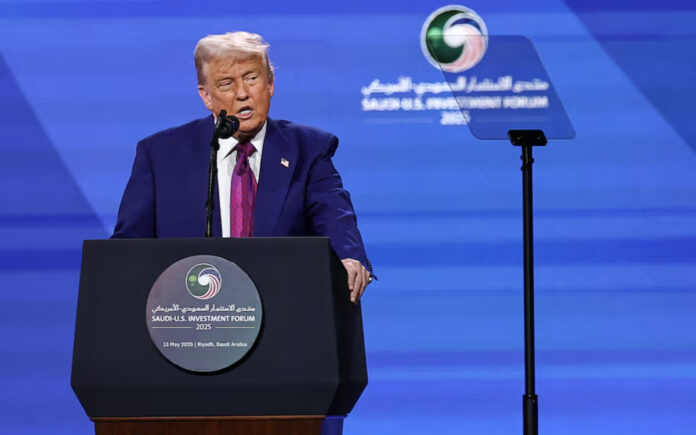Riyadh/Damascus: In a significant shift in U.S. foreign policy, President Donald Trump announced plans to lift all American sanctions on Syria, following appeals from Saudi Crown Prince Mohammed bin Salman and Turkish President Tayyip Erdogan. The decision paves the way for a new diplomatic engagement with Syria’s Islamist President Ahmed al-Sharaa, ahead of a planned meeting in Saudi Arabia.
According to a White House official, Trump is scheduled to meet Sharaa on Wednesday in Riyadh. Two Syrian presidential sources confirmed to Reuters that the meeting will take place Wednesday morning. Sharaa, a former al Qaeda commander, assumed power after the fall of President Bashar al-Assad and has since attempted to consolidate control over the fractured nation.
“I will be ordering the cessation of sanctions against Syria in order to give them a chance at greatness,” Trump declared at an investment forum in Riyadh. “It’s their time to shine. We’re taking them all off. Good luck Syria, show us something very special.”
The surprise announcement signals a potential thaw in U.S.-Syria relations, with Trump emphasizing the need to support the country’s reconstruction efforts. By lifting sanctions that have cut Syria off from the global financial system, the United States would ease pathways for humanitarian aid, foreign investment, and international trade.
In a major US policy shift ahead of an expected meeting with Syria's President Ahmed al-Sharaa, US President Donald Trump said he would order the lifting of sanctions on Syria at the behest of Saudi Arabia's crown prince https://t.co/w7YWOMFVOH pic.twitter.com/Jv9YeEBhKN
— Reuters (@Reuters) May 14, 2025
The move, however, has raised concerns in Israel, where officials remain wary of Sharaa’s background. Despite his public break from al Qaeda in 2016, Israeli authorities still consider him a jihadist threat. Israel’s government has not yet commented on the development.
Trump acknowledged the initial role of the sanctions, saying they were necessary at the time, but insisted the situation had changed. He added that U.S. Secretary of State Marco Rubio would soon meet his Syrian counterpart to discuss restoring formal diplomatic ties.
Syrian Foreign Minister Asaad al-Shibani welcomed the decision, telling Reuters it marked a historic shift for Syria.
“We … stand ready to foster a relationship with the United States that is rooted in mutual respect, trust and shared interests,” Shibani said.
He further suggested that Trump could achieve a “historic peace deal and victory for U.S. interests in Syria,” though he did not provide specifics.

Lebanese President Joseph Aoun also praised the decision, calling it a “bold move” that could accelerate Syria’s path toward stability and reconstruction.
Alex Zerden, a senior fellow at the Center for a New American Security, described the sanctions rollback as an “unwinding of a Gordian knot” involving complex export controls and terrorist designations that had placed Syria among the most economically isolated nations, alongside Iran, North Korea, and Cuba.
Under Assad, Syria maintained a hostile posture toward Israel and aligned closely with Iran and Russia, fostering decades of strained ties with the West. Despite this legacy, recent months have seen signs of potential détente.
Also Read | US Finalizes $142 Billion Arms Deal with Saudi Arabia, Marking Historic Defense Accord
Since December, Israel’s military has occupied parts of southern Syria near the Golan Heights and continued its aerial operations in the region. However, Syrian officials have recently indicated openness to eventual peace talks with Israel.
The lifting of sanctions marks a political win for Sharaa, who has struggled to assert control across the country amid ongoing insurgencies and sectarian violence. In March, pro-Assad factions clashed with government forces, sparking reprisals in which hundreds of Alawite civilians were killed by Islamist militants, triggering condemnation from Washington.
Sharaa, once the leader of al Qaeda’s Syrian branch, had been imprisoned by U.S. forces during the Iraq conflict. The United States removed a $10 million bounty on his head late last year, further signaling a shift in policy.
Also Read | Alien Enemies Act Invoked: Judge Greenlights Trump’s Gang Deportation Strategy
Though most U.S. sanctions on Syria were enacted by Congress, many include provisions that allow the president to suspend them if deemed in the interest of national security.
Bipartisan reactions in Washington reflected cautious optimism. Senator Jeanne Shaheen, the top Democrat on the Senate Foreign Relations Committee, said the move could support Syria and Lebanon.
“It’s important for us to provide the opportunity to keep those countries moving in a way that continues to keep out Iran and Russia,” she told reporters.
Republican Senator Lindsey Graham expressed conditional support:
“This newly formed government in Syria may be a good investment and could be the pathway to unifying Syria, making it a stable part of the region. However, there is a lot that must be learned before making that determination.”
The United Nations also welcomed Trump’s announcement. U.N. spokesperson Stephane Dujarric stated:
“It was important for us to see relief on sanctions on Syria to help the reconstruction of Syria, to help the Syrian people recover from more than a decade of conflict, a decade of under investment.”
Hayat Tahrir al-Sham (HTS), formerly the Nusra Front and once al Qaeda’s official branch in Syria, severed its links in 2016 and was formally dissolved earlier this year. The group remains on the U.N. Security Council’s sanctions list, but there are currently no U.N. sanctions directly targeting Syria’s government.
If successfully implemented, Trump’s move could reshape the geopolitical landscape of the Middle East, with implications for U.S. influence, humanitarian recovery, and regional diplomacy.



